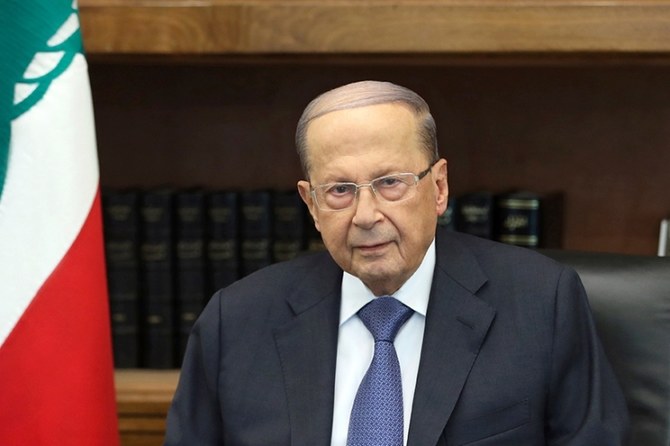BEIRUT: Lebanese President Michel Aoun sent a cable of congratulations Friday to King Salman on the occasion of Saud Arabia’s Founding Day.
“This occasion holds many bright milestones in the Kingdom’s history, which, with its vision and efforts, has managed to reserve an advanced position among the modern countries striving for broader horizons. Saudi Arabia has never spared any effort to defend the just humanitarian and Arab causes, and to preserve the unified Arab world despite all the circumstances in the region,” Aoun said.
He further praised the Kingdom’s support for Lebanon and the Lebanese, hoping “bilateral ties will recover for the good of the two brotherly peoples.”
Aoun also sent a cable of congratulations to Crown Prince Mohammed bin Salman, stressing the importance of this occasion, which “is one of the brightest milestones in the history of Saudi Arabia that overcame many challenges in order to build a brighter tomorrow.”
Speaking before a delegation of Arab justice ministers in Lebanon on Friday, Aoun stressed “Lebanon’s full desire to cooperate with Arab countries and show solidarity in all issues that help develop and strengthen laws and unify legislation in these countries.”
He hoped that the delegation would contribute to alleviating the problems that sometimes arise between the Arab brothers.
“Beirut's doors are open to everyone, especially to the Arab brothers,” Aoun said.
Arab League Secretary-General Ahmed Aboul Gheit and Assistant Secretary-General Hossam Zaki arrived in Beirut on Friday to participate in a ceremony to honor three winners of the award for the best doctoral thesis in the Arab World in the field of law and justice.
Meanwhile, several pro-Syrian regime and Hezbollah figures objected to the position expressed by the Lebanese Foreign Ministry condemning the Russian invasion of Ukraine.
Foreign Minister Abdullah Bou Habib met the ambassadors of France and Germany to Lebanon, who thanked Lebanon for its stance. They requested Lebanon’s participation in “adopting the resolution submitted to the UN Security Council on the crisis and voting on it in the General Assembly.”
Bou Habib’s media office reported that he assured the two ambassadors that “Lebanon stands firm in its position which stems from its keenness to adhere to the principles of international legitimacy and international law, which constitute the basic guarantee to protecting international peace, order and the territorial integrity of small countries, especially since Lebanon has suffered greatly from the Israeli occupation and its continuous violations.”
However, he said, “Lebanon will abstain from adopting the resolution submitted to the Security Council and the Lebanese position regarding the vote will be considered later on in the event that the resolution is referred to the General Assembly.”
Bou Habib said that he met the Russian ambassador to Lebanon on Thursday and informed him that Lebanon was about to issue “a statement condemning the Russian military operation, but this position is not directed against Russia and we do not want it to affect the solid bilateral relationship.”
Lebanon’s Mills Association feared a wheat crisis since “Lebanon imports the majority of its wheat from Ukraine and all wheat sale deals have been canceled due to force majeure, leading to an increase in the price of a ton of wheat by $45 to $50.”
Economy Minister Amin Salam revealed: “Negotiations have been underway for about three months with several countries, including India and the US, in search of alternative sources of wheat. If the situation develops in Ukraine and it becomes impossible to import from it, we will of course resort to other sources.”
Salam explained: “There are five ships in the port of Beirut and other ships are arriving soon, and the Central Bank has approved transferring funds to cover imported wheat. This stock is sufficient for more than a month, and we will work to secure more. We assure the Lebanese that there is no problem in this field.”




























